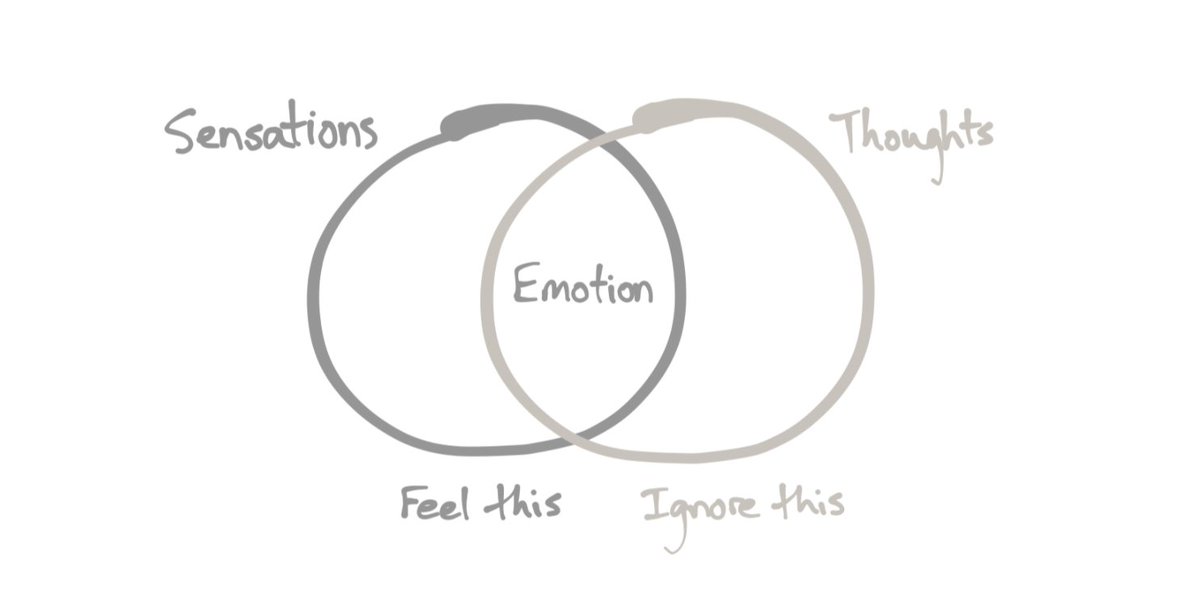Understanding is a courageous act.
How so?
Many people are entirely unable to understand new ideas.
They aren’t stupid or uneducated, so what’s the problem?
The problem is their *emotional reaction against the new idea* is stronger than their desire to understand it.
1/
How so?
Many people are entirely unable to understand new ideas.
They aren’t stupid or uneducated, so what’s the problem?
The problem is their *emotional reaction against the new idea* is stronger than their desire to understand it.
1/
It takes courage to overcome your emotional reaction against new ideas — to overcome feelings like getting offended, or feeling compelled to respond to an argument.
“Wait, does this mean everyone who upsets me is actually right?”
No!
2/
“Wait, does this mean everyone who upsets me is actually right?”
No!
2/
3/
Having an emotional reaction to a new idea indicates two things:
- You are not certain that it’s true
- You are not willing to acknowledge this uncertainty
Having an emotional reaction does *not* automatically mean your current belief is false.
Having an emotional reaction to a new idea indicates two things:
- You are not certain that it’s true
- You are not willing to acknowledge this uncertainty
Having an emotional reaction does *not* automatically mean your current belief is false.
4/
However, if you are both uncertain and unwilling to acknowledge your uncertainty, an emotional reaction indicates your belief is (at least partly)
** Insincere. **
An emotional reaction indicates you might have the belief for reasons other than the honest search for truth.
However, if you are both uncertain and unwilling to acknowledge your uncertainty, an emotional reaction indicates your belief is (at least partly)
** Insincere. **
An emotional reaction indicates you might have the belief for reasons other than the honest search for truth.
5/
For example, you might believe something to:
- Meet psychological needs
- Justify past behaviors
- Identify with a respected group
- Disidentify from a scorned group
If any of these is higher priority than "just want the truth, please," you'll feel upset when confronted.
For example, you might believe something to:
- Meet psychological needs
- Justify past behaviors
- Identify with a respected group
- Disidentify from a scorned group
If any of these is higher priority than "just want the truth, please," you'll feel upset when confronted.
6/
Conversely, a lack of negative reaction *does not automatically mean your beliefs are true.*
It probably means you're aware of and comfortable with whatever contradictions or uncertainties there may be.
Conversely, a lack of negative reaction *does not automatically mean your beliefs are true.*
It probably means you're aware of and comfortable with whatever contradictions or uncertainties there may be.
7/
EXERCISE:
When you feel offended, hold the upsetting idea in mind, and allow yourself to *feel what you would feel if you believed it were true.*
Examine the idea thoroughly.
1) Seek out interpretations that upset you
and then
2) Fully feel what arises
EXERCISE:
When you feel offended, hold the upsetting idea in mind, and allow yourself to *feel what you would feel if you believed it were true.*
Examine the idea thoroughly.
1) Seek out interpretations that upset you
and then
2) Fully feel what arises
8/
Rationality is an emotional achievement, not an intellectual one.
It doesn’t matter how smart someone is if they can’t overcome their own *desire to misunderstand.*
By overcoming *your* desire to misunderstand, you can leapfrog almost everyone, even much "smarter" people.
Rationality is an emotional achievement, not an intellectual one.
It doesn’t matter how smart someone is if they can’t overcome their own *desire to misunderstand.*
By overcoming *your* desire to misunderstand, you can leapfrog almost everyone, even much "smarter" people.
9/
Get my ebook, Radical Stoic Mindfulness, to learn how to "fully feel what arises" in a way that actually heals you, without unnecessary stress.
http://radicalstoicmindfulness.com


Get my ebook, Radical Stoic Mindfulness, to learn how to "fully feel what arises" in a way that actually heals you, without unnecessary stress.
http://radicalstoicmindfulness.com


10/
Ideas are alchemical.
Understanding a new idea isn't like holding it at arm's distance, evaluating it like a gemstone.
It's *allowing it to change you.*
Ideas are alchemical.
Understanding a new idea isn't like holding it at arm's distance, evaluating it like a gemstone.
It's *allowing it to change you.*
11/
There's risk involved in understanding something new.
You could even say there's FAITH involved.
Faith that "I'll be okay even if this is true."
And how REASONable can you be if you don't trust you can survive changing your mind?
There's risk involved in understanding something new.
You could even say there's FAITH involved.
Faith that "I'll be okay even if this is true."
And how REASONable can you be if you don't trust you can survive changing your mind?
12/
Whatever takes priority over "just the truth, please"
determines what you'll believe.
YOUR CONCLUSIONS ARE PRE-DETERMINED BY YOUR PRIORITIES.
Whatever takes priority over "just the truth, please"
determines what you'll believe.
YOUR CONCLUSIONS ARE PRE-DETERMINED BY YOUR PRIORITIES.
13/
"Rationality" is subject to priorities.
Priorities are emotional commitments.
To become more rational, master your emotions.
"Rationality" is subject to priorities.
Priorities are emotional commitments.
To become more rational, master your emotions.

 Read on Twitter
Read on Twitter


